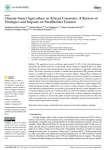Ariom T.O., Dimon E., Nambeye E., Diouf N.S., Adelusi O.O., Boudalia S. (2022). Climate-smart agriculture in African countries: a review of strategies and impacts on smallholder farmers. Sustainability, 15/09/2022, vol. 14, n. 18, p. 1-32.
https://doi.org/10.3390/su141811370
https://doi.org/10.3390/su141811370
| Titre : | Climate-smart agriculture in African countries: a review of strategies and impacts on smallholder farmers (2022) |
| Auteurs : | T.O. Ariom ; E. Dimon ; E. Nambeye ; N.S. Diouf ; O.O. Adelusi ; S. Boudalia |
| Type de document : | Article |
| Dans : | Sustainability (vol. 14, n. 18, September 2022) |
| Article en page(s) : | p. 1-32 |
| Langues : | Anglais |
| Langues du résumé : | Anglais |
| Catégories : |
Catégories principales 06 - AGRICULTURE. FORÊTS. PÊCHES ; 6.4 - Production Agricole. Système de ProductionThésaurus IAMM AGRICULTURE NUMERIQUE ; CHANGEMENT CLIMATIQUE ; PETITE EXPLOITATION AGRICOLE ; POLITIQUE AGRICOLE ; AFRIQUE ; ALGERIE ; SENEGAL ; BENIN ; NIGERIA ; ZAMBIE |
| Résumé : | The agricultural sector contributes approximately 10-20% of the total anthropogenic greenhouse gas (GHGs) emissions. Consequently, climate change can negatively affect crop yields and livestock production thus threatening food security, especially in a vulnerable continent like Africa. This review provides an overview of climate-smart agriculture (CSA) practices and their impacts on smallholder farmers in five African countries (Algeria, Senegal, Benin, Nigeria and Zambia). A total of 164 published articles on CSA practices were reviewed. Analysis of extracted data showed that CSA practices are classified as follows: agricultural practices, restoration practices of degraded lands, forest and cropland regeneration practices, practices in the livestock sub-sector, water resources and use of weather and climate information services. Moreover, climate change effects differed alongside strategies adapted from one country to another. Adoption of these strategies was often influenced by financial means put in place by governments, the role of policy legislation, access to climate information and farmers’ intellectual level. To address this deficiency, scientific-outcome-based research should be used to increase the effectiveness of climate adaptation management programs. In conclusion, to enhance the uptake of climate-smart agricultural practices in Africa, this review recommends the use of scientific-research-driven adaptation measures and prioritization of climate change in governments' agendas. |
| Cote : | En ligne |
| URL / DOI : | https://doi.org/10.3390/su141811370 |







